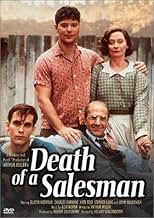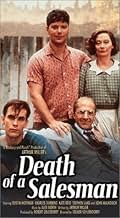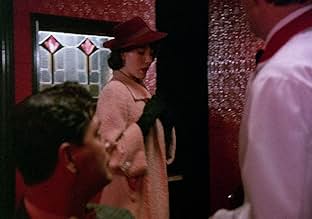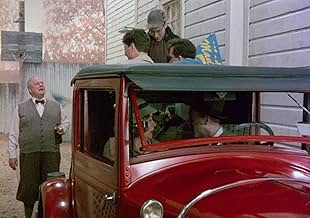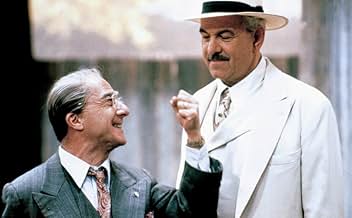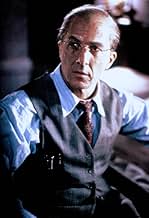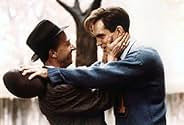IMDb RATING
7.2/10
12K
YOUR RATING
An aging traveling salesman recognizes the emptiness of his life and tries to fix it.An aging traveling salesman recognizes the emptiness of his life and tries to fix it.An aging traveling salesman recognizes the emptiness of his life and tries to fix it.
- Won 3 Primetime Emmys
- 7 wins & 12 nominations total
David Chandler
- Bernard
- (as David S. Chandler)
Kathryn Rossetter
- Woman from Boston
- (as Kathy Rossetter)
Featured reviews
On the age of sixty and something years, the salesman Willy Loman (Dustin Hoffman) realizes that he is a loser and his empty life was a worthless fraud. The disturbed and deranged Willy becomes delusional, mixing fantasy and reality, and disclosing secrets of his family.
"Death of the Salesman" is a very depressive and tragic theatrical movie with awesome performances, mainly of Dustin Hoffman, Kate Reid and John Malkovitch. I have never read Arthur Miller's novel or seen the movie or the play; therefore I did not expect such a sad story with so complex characters. The story, in the 40's, shows the evil face of the capitalism (and the American Dream), and the character of Dustin Hoffman becomes insane when he sees that he is a loser and his life a complete failure: he is paying the last installment of his old house after thirty years of sacrifice; his sons have not been successful in life; his old car is broken; his old refrigerator needs repair; he does not have any money after more than thirty years working for the same company and in the end he is treated like a street dog and fired. For a viewer that does not know this drama (like me), I recommend to see this movie in a happy day, otherwise he or she may become too much depressed with such heart-breaking story. My vote is eight.
Title (Brazil): "Morte do Caixeiro-Viajante" ("Death of the Salesman")
"Death of the Salesman" is a very depressive and tragic theatrical movie with awesome performances, mainly of Dustin Hoffman, Kate Reid and John Malkovitch. I have never read Arthur Miller's novel or seen the movie or the play; therefore I did not expect such a sad story with so complex characters. The story, in the 40's, shows the evil face of the capitalism (and the American Dream), and the character of Dustin Hoffman becomes insane when he sees that he is a loser and his life a complete failure: he is paying the last installment of his old house after thirty years of sacrifice; his sons have not been successful in life; his old car is broken; his old refrigerator needs repair; he does not have any money after more than thirty years working for the same company and in the end he is treated like a street dog and fired. For a viewer that does not know this drama (like me), I recommend to see this movie in a happy day, otherwise he or she may become too much depressed with such heart-breaking story. My vote is eight.
Title (Brazil): "Morte do Caixeiro-Viajante" ("Death of the Salesman")
The salesman of the title is Willy Loman, a man in his early sixties, approaching retirement. Despite his long service, travelling from his New York base all over New England in the service of his employers, he has never enjoyed great success in his job. He is in financial difficulties, struggling to pay the mortgage on his house and the instalments on the consumer goods- refrigerator, vacuum cleaner, car- which were becoming popular in the forties but which represented a major commitment, even in middle class households. In order to make ends meet, he has taken to borrowing from his old friend Charlie.
His sense of failure, however, does not derive solely from his unsuccessful career. He also sees himself as having failed in his private life. Although his marriage to his loyal wife Linda has survived, despite the fact that he has on occasions been unfaithful to her, his relationships with his two sons are strained. Biff, the elder, showed promise when young in both the academic and sporting fields, but failed to win a place at university after failing a maths exam at school, and since has become a rootless drifter, alternating between dead-end jobs and petty crime. Biff has been particularly alienated from his father since discovering one of Willy's affairs. Happy, the younger, has been more successful than Biff in his career, but in his private life is a selfish, cynical womaniser.
Willy is much given to violent mood swings, alternating between exuberant over-optimism and despairing pessimism. The younger Willy's optimism was largely focused on his own career, believing that he had a talent for making himself "well liked" which would lead to a brilliant career. The older Willy's hopes are mostly focused on his sons, especially Biff, whom he still believes (in the teeth of all the evidence) to be capable of great things. When his son disappoints him, Willy turns on him fiercely, accusing him of being a "lazy bum". Biff's lack of success in life does indeed derive partly from his own weaknesses, but Willy's unrealistic expectations are also partly to blame; Biff would probably be happiest working with his hands, but Willy tries to pressure him into taking a white-collar job.
The film follows the play in that on a number of occasions the action switches abruptly from the present into the past, as the characters act out episodes from earlier in Willy's life. Some of these episodes, in fact, may exist only in Willy's imagination, particularly those involving his wealthy older brother Ben, who is now dead although that does not prevent him from making several appearances. Ben, in fact, is not really a character in his own right, but rather functions as a symbol of the failures and missed opportunities in Willy's life.
At one time filmed versions of stage plays were done in a similar way to theatrical productions (the Marlon Brando/Vivien Leigh "A Streetcar Named Desire" from the early fifties is a good example), but in the seventies and eighties the general tendency was to "open them up" by filming on location as well as on studio sets, by taking liberties with the playwright's text, often making significant changes to the plot and even introducing extra characters. "Death of a Salesman", although it was made as late as 1985, has a very old-fashioned feel to it. It not only keeps Arthur Miller's plot unchanged, but also follows his text almost literally to the word. There is no attempt to open it up; it is filmed entirely on stylised, deliberately artificial-looking sets similar to those that would be used in a theatre.
Normally I would take the view that the cinema and the theatre are two different media and that one should not try to imitate the other. This film, however, was originally made for television and based on a Broadway production, and works better on the small screen than it probably would do on a big one. It is, in fact, a very good film, despite its old-fashioned, theatrical look. The main reason, apart from the quality of Miller's original play, is the quality of the acting. Dustin Hoffman called the role of Willy Loman his favourite acting experience; it is certainly one of his best, although not in my view his very best. (That remains "The Graduate"). He brings out all the complexities and contradictions in Willy's character, a man who is certainly difficult, perhaps even impossible, but at the same time also tragic and pitiable.
The play has been seen as a critique of the capitalist economy or of the American way of life. That is one possible interpretation, but there is more to it than that. It also deals with the plight of the elderly, especially those whom society no longer seems to value, with the human need, too often disappointed, to aspire to a better life, and with the gap between appearance and reality. On a more personal level it is also a character study and an exploration of the relationships within a family, especially father-son relationships. This means that the supporting cast has to be strong, and Hoffman certainly receives strong support, especially from Kate Reid as Linda, Charles Durning as Charley and above all from John Malkovich as Biff. The result was an excellent production that brought out the various levels of meaning in Miller's play as well as the tragedy of its central figure. 8/10
His sense of failure, however, does not derive solely from his unsuccessful career. He also sees himself as having failed in his private life. Although his marriage to his loyal wife Linda has survived, despite the fact that he has on occasions been unfaithful to her, his relationships with his two sons are strained. Biff, the elder, showed promise when young in both the academic and sporting fields, but failed to win a place at university after failing a maths exam at school, and since has become a rootless drifter, alternating between dead-end jobs and petty crime. Biff has been particularly alienated from his father since discovering one of Willy's affairs. Happy, the younger, has been more successful than Biff in his career, but in his private life is a selfish, cynical womaniser.
Willy is much given to violent mood swings, alternating between exuberant over-optimism and despairing pessimism. The younger Willy's optimism was largely focused on his own career, believing that he had a talent for making himself "well liked" which would lead to a brilliant career. The older Willy's hopes are mostly focused on his sons, especially Biff, whom he still believes (in the teeth of all the evidence) to be capable of great things. When his son disappoints him, Willy turns on him fiercely, accusing him of being a "lazy bum". Biff's lack of success in life does indeed derive partly from his own weaknesses, but Willy's unrealistic expectations are also partly to blame; Biff would probably be happiest working with his hands, but Willy tries to pressure him into taking a white-collar job.
The film follows the play in that on a number of occasions the action switches abruptly from the present into the past, as the characters act out episodes from earlier in Willy's life. Some of these episodes, in fact, may exist only in Willy's imagination, particularly those involving his wealthy older brother Ben, who is now dead although that does not prevent him from making several appearances. Ben, in fact, is not really a character in his own right, but rather functions as a symbol of the failures and missed opportunities in Willy's life.
At one time filmed versions of stage plays were done in a similar way to theatrical productions (the Marlon Brando/Vivien Leigh "A Streetcar Named Desire" from the early fifties is a good example), but in the seventies and eighties the general tendency was to "open them up" by filming on location as well as on studio sets, by taking liberties with the playwright's text, often making significant changes to the plot and even introducing extra characters. "Death of a Salesman", although it was made as late as 1985, has a very old-fashioned feel to it. It not only keeps Arthur Miller's plot unchanged, but also follows his text almost literally to the word. There is no attempt to open it up; it is filmed entirely on stylised, deliberately artificial-looking sets similar to those that would be used in a theatre.
Normally I would take the view that the cinema and the theatre are two different media and that one should not try to imitate the other. This film, however, was originally made for television and based on a Broadway production, and works better on the small screen than it probably would do on a big one. It is, in fact, a very good film, despite its old-fashioned, theatrical look. The main reason, apart from the quality of Miller's original play, is the quality of the acting. Dustin Hoffman called the role of Willy Loman his favourite acting experience; it is certainly one of his best, although not in my view his very best. (That remains "The Graduate"). He brings out all the complexities and contradictions in Willy's character, a man who is certainly difficult, perhaps even impossible, but at the same time also tragic and pitiable.
The play has been seen as a critique of the capitalist economy or of the American way of life. That is one possible interpretation, but there is more to it than that. It also deals with the plight of the elderly, especially those whom society no longer seems to value, with the human need, too often disappointed, to aspire to a better life, and with the gap between appearance and reality. On a more personal level it is also a character study and an exploration of the relationships within a family, especially father-son relationships. This means that the supporting cast has to be strong, and Hoffman certainly receives strong support, especially from Kate Reid as Linda, Charles Durning as Charley and above all from John Malkovich as Biff. The result was an excellent production that brought out the various levels of meaning in Miller's play as well as the tragedy of its central figure. 8/10
A generation after Lee J. Cobb originated the role on stage and Fredric March did
the big screen version, Dustin Hoffman does a really great job as Willy Loman in
Death Of A Salesman in a made for television version. It's a bit more surreal than
the others but Arthur Miller's message about misplaced values certainly gets
across.
All poor Willy Loman wanted to be was be liked and that to him became a creed. It's how you sell your product, it's how you sell yourself. He loved his family, but he was always 'on'. And forever envious of brother Ben who went out and took risks but saw the world.
Hoffman was years younger than March or Cobb, but with makeup he certainly looks the part. Kate Reid plays the wife and John Malkovich and Stephen Lang are sons Biff and Hap. They really function well as the Loman family unit and the chemistry is real.
Seeing how much purchasing is now done on line, I wonder if a lot of the message of Death Of A Salesman will be lost in the future. An audience in the future might not know what a salesman is or does as personal contact in buying and selling becomes less and less.
I certainly hope not.
All poor Willy Loman wanted to be was be liked and that to him became a creed. It's how you sell your product, it's how you sell yourself. He loved his family, but he was always 'on'. And forever envious of brother Ben who went out and took risks but saw the world.
Hoffman was years younger than March or Cobb, but with makeup he certainly looks the part. Kate Reid plays the wife and John Malkovich and Stephen Lang are sons Biff and Hap. They really function well as the Loman family unit and the chemistry is real.
Seeing how much purchasing is now done on line, I wonder if a lot of the message of Death Of A Salesman will be lost in the future. An audience in the future might not know what a salesman is or does as personal contact in buying and selling becomes less and less.
I certainly hope not.
This TV adaptation of Arthur Miller's most successful play benefits from the serious playing of Dustin Hoffman in the lead as failing salesman Willy Loman. Miller's play takes the plight of the common man within the confines of the 'American dream' and then kicks him down.
Loman's sons are played by John Malkovich (Biff, memorable) and Stephen Lang (Happy, irritating); while his wife is played with tact and resignation by Kate Reid.
The stagey feel of this production comes across in every scene (the famous ones especially with Howard, Loman's boss; and Bernard, the successful son of Loman's colleague; and the final scenes with Linda) although they are handled very well. It would be a temptation to dismiss Willy Loman as loopy and in the throes of a breakdown and to ignore everything he says, but his words strike a chord and stay with you. 'Death of a Salesman' still has something to say to us, and a warning to give, even six decades after it was written.
Loman's sons are played by John Malkovich (Biff, memorable) and Stephen Lang (Happy, irritating); while his wife is played with tact and resignation by Kate Reid.
The stagey feel of this production comes across in every scene (the famous ones especially with Howard, Loman's boss; and Bernard, the successful son of Loman's colleague; and the final scenes with Linda) although they are handled very well. It would be a temptation to dismiss Willy Loman as loopy and in the throes of a breakdown and to ignore everything he says, but his words strike a chord and stay with you. 'Death of a Salesman' still has something to say to us, and a warning to give, even six decades after it was written.
Superb portrayal of tragic characters. One can sense the futility, frustration, and disappointment of Loman. As we age and our faculties deteriorate along with unrealized dreams, it is easy to grasp for hope even where none exists and transfer our aspirations to the next generation only to have them carry your faults and failings in addition to their own. Profoundly sad but unfortunately that is the reality for countless billions of the human race. 8/10.
Did you know
- TriviaDustin Hoffman called this his favorite acting experience.
- GoofsWhen Willy comes out of his flashback in the bathroom of Frank's Chop House, the close up shot shows a drink on the toilet seat. When the shot shifts behind the entering waiter, the drink is gone.
- Quotes
Biff Loman: I run out of that building and I see... the sky. I see all the things I love in this world. The work, the food, the time to sit and smoke. And I look at this pen and I ask myself, "What the hell am I grabbing this thing for? Why am I trying to become something I don't wanna become when all I want is out there waiting for me the minute I say I know who I am?"
- ConnectionsFeatured in American Masters: Arthur Miller: Private Conversations (1985)
- Is this movie based on a book?
Details
- Release date
- Country of origin
- Official site
- Language
- Also known as
- Death of a Salesman
- Filming locations
- Production companies
- See more company credits at IMDbPro
Contribute to this page
Suggest an edit or add missing content

Top Gap
By what name was Mort d'un commis-voyageur (1985) officially released in Canada in English?
Answer

